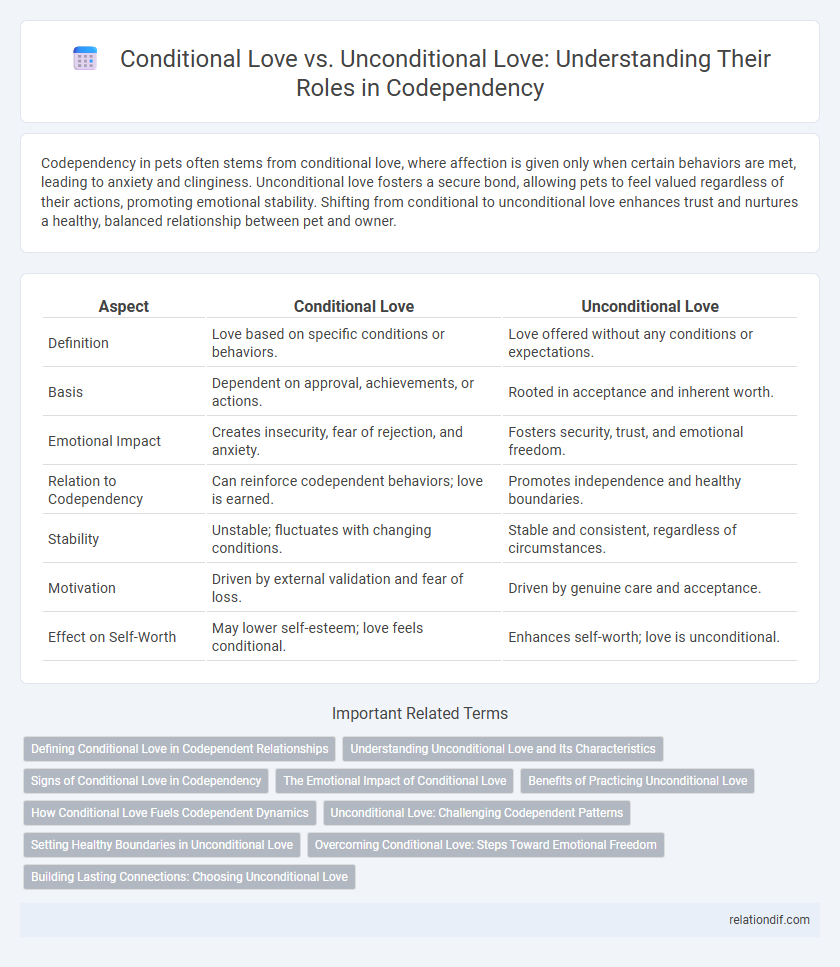Codependency in pets often stems from conditional love, where affection is given only when certain behaviors are met, leading to anxiety and clinginess. Unconditional love fosters a secure bond, allowing pets to feel valued regardless of their actions, promoting emotional stability. Shifting from conditional to unconditional love enhances trust and nurtures a healthy, balanced relationship between pet and owner.
Table of Comparison
| Aspect | Conditional Love | Unconditional Love |
|---|---|---|
| Definition | Love based on specific conditions or behaviors. | Love offered without any conditions or expectations. |
| Basis | Dependent on approval, achievements, or actions. | Rooted in acceptance and inherent worth. |
| Emotional Impact | Creates insecurity, fear of rejection, and anxiety. | Fosters security, trust, and emotional freedom. |
| Relation to Codependency | Can reinforce codependent behaviors; love is earned. | Promotes independence and healthy boundaries. |
| Stability | Unstable; fluctuates with changing conditions. | Stable and consistent, regardless of circumstances. |
| Motivation | Driven by external validation and fear of loss. | Driven by genuine care and acceptance. |
| Effect on Self-Worth | May lower self-esteem; love feels conditional. | Enhances self-worth; love is unconditional. |
Defining Conditional Love in Codependent Relationships
Conditional love in codependent relationships depends on meeting specific expectations or behaviors to receive affection and approval, creating an imbalance where love feels earned rather than freely given. This type of love often results in anxiety and insecurity, as individuals constantly strive to fulfill conditions to maintain the relationship. The absence of unconditional acceptance perpetuates emotional dependency and undermines genuine intimacy.
Understanding Unconditional Love and Its Characteristics
Unconditional love is characterized by acceptance without expectation or judgment, offering support and care regardless of circumstances or behaviors. It fosters emotional security and personal growth, contrasting with conditional love, which depends on fulfilling specific criteria or behaviors to earn affection. Understanding unconditional love helps break patterns of codependency by promoting healthy boundaries and self-worth independent of others' approval.
Signs of Conditional Love in Codependency
Signs of conditional love in codependency include constant need for approval, fear of rejection, and prioritizing others' needs over one's own well-being. Individuals often experience anxiety when love feels contingent upon meeting specific expectations or behaviors. This creates an unhealthy dependency pattern rooted in emotional manipulation and lack of self-worth.
The Emotional Impact of Conditional Love
Conditional love, often characterized by approval based on behaviors or achievements, creates emotional instability and insecurity in relationships. It fosters anxiety, low self-esteem, and fear of abandonment, leading individuals to constantly seek validation and approval. This emotional impact deepens codependency patterns, as people prioritize others' expectations over their authentic needs and feelings.
Benefits of Practicing Unconditional Love
Practicing unconditional love fosters emotional resilience and healthier relationships by promoting acceptance and reducing dependency on others' approval. It encourages personal growth and self-worth, enabling individuals to overcome codependency patterns. Embracing unconditional love creates a supportive environment where trust and authentic connections thrive, improving overall mental well-being.
How Conditional Love Fuels Codependent Dynamics
Conditional love, based on meeting specific expectations or behaviors, reinforces codependent dynamics by making self-worth contingent on approval and validation from others. This creates a cycle where individuals constantly strive to earn love through compliance, neglecting personal boundaries and authentic emotional needs. Over time, this dependency undermines healthy relationship patterns and fosters emotional instability.
Unconditional Love: Challenging Codependent Patterns
Unconditional love fosters healthy relationships by embracing acceptance without expectations, breaking free from the cycle of codependency where love is earned through approval or sacrifice. It nurtures emotional independence and self-worth, allowing individuals to set boundaries while offering support authentically. Cultivating unconditional love challenges codependent patterns by promoting genuine connection based on mutual respect rather than reliance or control.
Setting Healthy Boundaries in Unconditional Love
Setting healthy boundaries in unconditional love involves recognizing and respecting personal limits while maintaining genuine care and support. Unlike conditional love, which depends on specific behaviors or outcomes, unconditional love fosters emotional safety by allowing individuals to express needs and say no without fear of rejection. This balance prevents codependency by promoting autonomy and mutual respect within relationships.
Overcoming Conditional Love: Steps Toward Emotional Freedom
Overcoming conditional love involves recognizing and challenging the patterns of dependence and approval-seeking that limit emotional freedom. Establishing healthy boundaries, practicing self-compassion, and fostering authentic self-worth empower individuals to shift from conditional to unconditional love. Emotional freedom arises when love is given and received without expectations, nurturing genuine connections and personal growth.
Building Lasting Connections: Choosing Unconditional Love
Building lasting connections requires choosing unconditional love, characterized by acceptance and support regardless of circumstances, which fosters emotional security and mutual growth. Conditional love, dependent on specific behaviors or achievements, often leads to insecurity and codependent patterns in relationships. Embracing unconditional love promotes healthy boundaries and authentic intimacy, essential for overcoming codependency.
Conditional Love vs Unconditional Love Infographic

 relationdif.com
relationdif.com